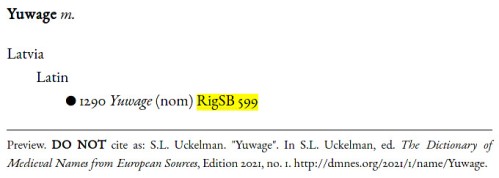Back in December 2015 our editor-in-chief, Sara L. Uckelman, asked why was it in the Estonian name data, that “the nickname forms were more common than full forms”? For Throwback Thursday today, we’re revisiting this topic with some research that partially addresses the question:
The short answer is that it is an artefact a lot of our name data coming from sources that focus on Wackenbücher. These are socage registers that not only record the obligations of peasants to their manors, but also details such as the names of the heads of the peasant households. So a lot of the examples of names of Estonians in the Dictionary belonged to the indigenous peasants, as well as wealthier Europeans who had settled in the territory.
In Anti Selart (2016:182)’s article on the adoption of Christian given names in the Baltics, he argues that the form that a name took in medieval Estonia indicated social status:
For instance, when a merchant became a member of the City Council, Hans became her Johann (“Master Johann”). In the sixteenth century Estonia (no earlier records are available), a social gradation of certain peasant name forms is visible. For example, Hans has a higher status than Hannos, Jaagup is finer than Jaak and Peeter is better than Peep.
And the names we have listed in the DMNES seems to reflect reflect this hierarchy. The urban members of the Tallinn Table Guild (Tafelgilde), part of the Great Guild established by the German merchants of the city (Mänd 2017), are called names like Peter, Jakop, Johan or Hans, while those associated with rural manors on the island of Hiiumaa recorded with names like Peep, or Jake.
While the Dictionary aims to record given names used in Europe between 500 and 1600, it does not include biographical information about individuals like a prosopographical database. But once you start trying to answer the question of “why” diminutives and hypocoristics were so popular in medieval Estonia, the answers you find are fascinating.
(Many thanks to Rebecca Le Get, whose many year’s study in Baltic names resulted in this info.)
References and Further Reading:
Mänd, A. 2017. “Table Guilds and Urban Space: Charitable, Devotional, and Ritual Practices in Late Medieval Tallinn” In: Space, place, and motion. Locating confraternities in the late medieval and early modern city: 21-46.
Palli, H. 1961. “Eesti isikunimede kasutamisest meie rahva vanema ajaloo (XII–XVI saj.) uurimisel.” Eesti NSV Teaduste Akadeemia Toimetised. Ühiskonnateaduste. 10: 132–142.
Selart, A. 2016. “A new faith and a new name? Crusades, conversion, and baptismal names in medieval Baltics”, Journal of Baltic Studies 47(2): 179-196.






